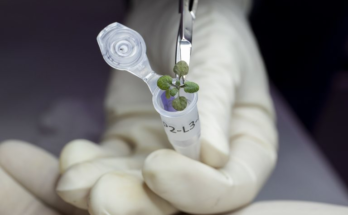
Amid last week’s jubilant news segments featuring frontline healthcare workers getting their first dose of Pfizer’s COVID-19 vaccine came reports that put a damper on the excitement: that some of the vaccine recipients experienced severe allergic reactions following their shot.
These stories are (understandably) unsettling—particularly for those who have allergies. But rather than panic, it’s important to take a look at these incidents in a wider context. Here’s what to know about the COVID vaccines and allergies, including updated safety guidelines from the Centers for Disease Control and Prevention (CDC).
Allergic reactions to the Pfizer COVID vaccine
On Sunday afternoon, the CDC reported that 556,000 doses of the Pfizer COVID-19 vaccine had been administered in the United States. And as of Saturday, Dec. 19, the CDC identified six cases of anaphylaxis—a severe, potentially life-threatening allergic reaction—among those who had received the first vaccine to receive emergency use authorization (EUA) from the Food and Drug Administration (FDA).
G/O Media may get a commission
So far, there haven’t been any publicly reported cases of anaphylaxis among those who have received the Moderna vaccine—although today is only the second day it has been administered.
And while we’re on the subject, anaphylaxis is not unique to the COVID-19 vaccine: These severe allergic reactions can happen with any vaccine. Fortunately, they’re extremely rare, occurring, on average, with about one dose per million administered.
Were there cases of anaphylaxis in the clinical trials?
Before both the Pfizer and Moderna vaccines received EUA, they each had to meet strict safety requirements—which also covered potential allergic reactions. But none of the participants in either clinical trial experienced anaphylaxis after receiving the vaccine, leaving scientists wondering what is causing these severe reactions now.
Despite reports that the Pfizer vaccine clinical trial excluded anyone with a history of severe food or drug allergies, that wasn’t exactly the case. There were approximately 6,000 participants in the vaccine’s late-stage trial with a history of a range of allergies, including to pollen and food, Reuters reported. But people with a past severe adverse reaction to any vaccine (or to a component of the Pfizer vaccine) were excluded.
A new study focused on allergic reactions
Yesterday, officials from the National Institutes of Health (NIH) announced that design has begun on a study that aims to determine whether a specific component of the vaccine is likely behind these allergic reactions, or if they were simply coincidental. Not only is there pressure to get this information as quickly as possible, but the study itself also presents a major challenge, given that it will involve people who have a history of severe allergic reactions.
Scientists have identified one potential suspect so far: a compound called polyethylene glycol (PEG) that is found in the packaging of the messenger RNA (mRNA) used in both the Pfizer and Moderna vaccines. Though, as Science reports, PEG has never been used in an approved vaccine before, it is found in several drugs known to occasionally trigger anaphylaxis.
What people with allergies should know about the COVID vaccines
Although it’s not yet clear what, exactly, has been causing the cases of anaphylaxis in Pfizer vaccine recipients, the CDC has issued a set of guidelines to help us make informed choices about vaccination when it gets to be our turn:
- Avoid a particular COVID-19 vaccine if you have ever had a severe allergic reaction to any of its ingredients (here are the ingredient lists for Pfizer and Moderna).
- Don’t get the second dose of a vaccine if you have a severe allergic reaction to the first shot.
- Ask your doctor about whether you should get a COVID-19 vaccine if you’ve had a severe allergic reaction to other vaccines or injectable therapies.
- People with a history of severe allergic reactions not related to vaccines or injectable medications—such as allergies to food, pet, venom, or latex, or environmental allergies—may still get vaccinated.
- People with a history of allergies to oral medications or a family history of severe allergic reactions, or who might have a milder allergy to vaccines (but no anaphylaxis) may also still get vaccinated.
What happens if you have an allergic reaction after receiving the vaccine
Any healthcare facility or professional administering a COVID-19 vaccine has been given a set of instructions to follow in the event that someone has an allergic reaction. But as the person receiving the vaccine, it’s important for you to also be familiar with the procedure—whether or not you have a history of allergies. Here are the recommended safeguards from the CDC:
- All people who get a COVID-19 vaccine should be monitored on-site. People with a history of severe allergic reactions should be monitored for 30 minutes after getting the vaccine. All other people should be monitored for 15 minutes after getting the vaccine.
- Vaccination providers should have appropriate medications and equipment—such as epinephrine, antihistamines, stethoscopes, blood pressure cuffs, and timing devices to check your pulse—at all COVID-19 vaccination sites.
- If you experience a severe allergic reaction after getting a COVID-19 vaccine, vaccination providers should provide rapid care and call for emergency medical services. You should continue to be monitored in a medical facility for at least several hours.
For what it’s worth, the rule about monitoring everyone for 15 minutes following their vaccination isn’t specific to the COVID vaccines. It’s routine procedure for the flu vaccine, too.
If you’d like more information on the COVID-19 vaccines and allergies, Allergic Living has put together this helpful FAQ.



